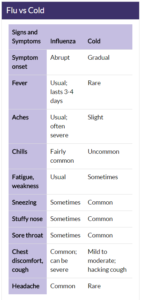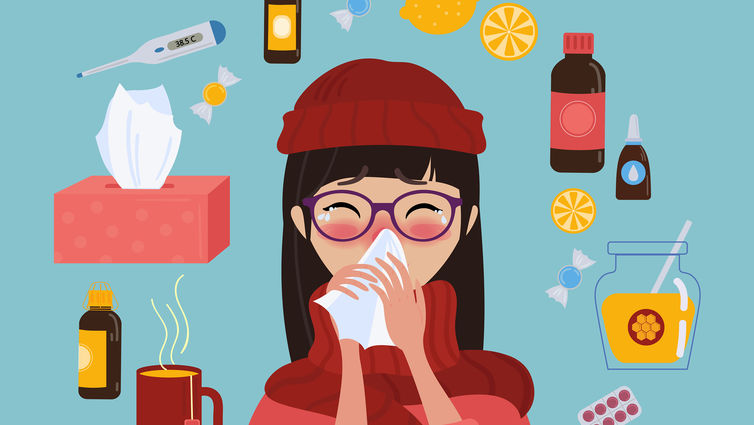Flu Symptoms
Influenza (also known as the flu) is a contagious respiratory illness caused by flu viruses. It can cause mild to severe illness, and at times can lead to death. The flu is different from a cold. The flu usually comes on suddenly.
People who have the flu often feel some or all of these symptoms:
- Fever* or feeling feverish/chills
- Cough
- Sore throat
- Runny or stuffy nose
- Muscle or body aches
- Headaches
- Fatigue (tiredness)
- Some people may have vomiting and diarrhea, though this is more common in children than adults.
* It’s important to note that not everyone with flu will have a fever.
Flu Complications
Most people who get influenza will recover in a few days to less than two weeks, but some people will develop complications (such as pneumonia) as a result of the flu, some of which can be life-threatening and result in death.
Pneumonia, bronchitis, sinus and ear infections are examples of complications from flu. The flu can make chronic health problems worse. For example, people with asthma may experience asthma attacks while they have the flu, and people with chronic congestive heart failure may experience worsening of this condition that is triggered by the flu.
People at High Risk for the Flu
Anyone can get the flu (even healthy people), and serious problems related to the flu can happen at any age, but some people are at high risk of developing serious flu-related complications if they get sick. This includes people 65 years and older, people of any age with certain chronic medical conditions (such as asthma, diabetes, or heart disease), pregnant women, and young children.
Emergency warning signs of flu sickness
In adults
- Difficulty breathing or shortness of breath
- Pain or pressure in the chest or abdomen
- Sudden dizziness
- Confusion
- Severe or persistent vomiting
- Flu-like symptoms that improve but then return with fever and worse cough
In children
- Fast breathing or trouble breathing
- Bluish skin color
- Not drinking enough fluids
- Not waking up or not interacting
- Being so irritable that the child does not want to be held
- Flu-like symptoms improve but then return with fever and worse cough
- Fever with a rash
Prevention Tips from the CDC:
- Get a flu vaccine!
- Try to avoid close contact with sick people.
- While sick, limit contact with others as much as possible to keep from infecting them.
- If you are sick with flu symptoms, CDC recommends that you stay home for at least 24 hours after your fever is gone except to get medical care or for other necessities. (Your fever should be gone for 24 hours without the use of a fever-reducing medicine.)
- Cover your nose and mouth with a tissue when you cough or sneeze. Throw the tissue in the trash after you use it.
- Wash your hands often with soap and water. If soap and water are not available, use an alcohol-based hand rub.
- Avoid touching your eyes, nose and mouth. Germs spread this way.
- Clean and disinfect surfaces and objects that may be contaminated with germs like the flu.
- If you get the flu, antiviral drugs can be used to treat your illness.
- Antiviral drugs are different from antibiotics. They are prescription medicines (pills, liquid or an inhaled powder) and are not available over-the-counter.
- Antiviral drugs can make illness milder and shorten the time you are sick. They may also prevent serious flu complications. For people with high risk factors, treatment with an antiviral drug can mean the difference between having a milder illness versus a very serious illness that could result in a hospital stay.
- Studies show that flu antiviral drugs work best for treatment when they are started within 2 days of getting sick, but starting them later can still be helpful, especially if the sick person has a high risk factor or is very sick from the flu. Follow your doctor’s instructions for taking this drug.
https://www.cdc.gov/flu/protect/preventing.htm
What should I do if I get sick?
Most people with the flu have mild illness and do not need medical care or antiviral drugs. If you get sick with flu symptoms, in most cases, you should stay home and avoid contact with other people except to get medical care.
If, however, you have symptoms of flu and are in a high risk group, or are very sick or worried about your illness, contact your health care provider (doctor, physician assistant, etc.).
Certain people are at high risk of serious flu-related complications (including young children, people 65 and older, pregnant women and people with certain medical conditions). This is true both for seasonal flu and novel flu virus infections. (For a full list of people at high risk of flu-related complications, see People at High Risk of Developing Flu–Related Complications).
If you are in a high risk group and develop flu symptoms, it’s best for you to contact your doctor early in your illness. Remind them about your high risk status for flu. CDC recommends that people at high risk for complications should get antiviral treatment as early as possible, because benefit is greatest if treatment is started within 2 days after illness onset.
Do I need to go the emergency room if I am only a little sick?
No. The emergency room should be used for people who are very sick. You should not go to the emergency room if you are only mildly ill.
If you have the emergency warning signs of flu sickness, you should go to the emergency room. If you get sick with flu symptoms and are at high risk of flu complications or you are concerned about your illness, call your health care provider for advice. If you go to the emergency room and you are not sick with the flu, you may catch it from people who do have it.
Steps to Take if You Get the Flu
- If you get very sick, are pregnant, or are 65 years or older, or are otherwise at high risk of flu-related complications, call your doctor. You might need antiviral drugs to treat flu.
- Stay at home and rest.
- Avoid close contact with well people in your house so you won’t make them sick.
- Drink plenty of water and other clear liquids to prevent fluid loss (dehydration).
When caring for people who have the Flu:
- Avoid being face to face with the sick person. If possible, it is best to spend the least amount of time in close contact with a sick person.
- When holding sick children, place their chin on your shoulder so they will not cough in your face.
- Wash your hands often and right way.
- If soap and water are not available, use an alcohol-based hand rub.
- Make sure to wash your hands after touching the sick person. Wash after handling their tissues or laundry.







